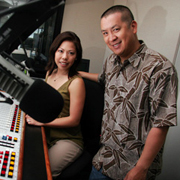| Press |

|
|
|
|
Evan and Kari's breezy yet thoughtful interview style encourages people such as master navigator Nainoa Thompson to talk about what really happened aboard the Hokule'a in 1978 when Eddie Aikau disappeared. Or David Carey, president and chief executive officer of Outrigger Enterprises, to explain why the death of his grandfather at a crucial time in his development helped dictate important life choices. Or U.S. Rep. Ed Case to share his personal experiences with "kill haole day." Or Joe Rice, president and chief executive officer of Mid-Pacific Institute, to talk about his horrific childhood as the oldest of 12 children, living in a car and in foster care, working on farms, and one day stabbing his stepfather to protect his family from further abuse before running away.
"Evan and Kari have an ability to disarm and reach into the guests' psyche (in search of) core values," said May, who also downloads Greater Good Radio podcasts. "Normally, you don't share these inner feelings, and I think they've made it comfortable to put it out there."
Arnoldus agreed. "Evan has an interesting style of interviewing people because it's very relaxed. They get you so comfortable that you're willing to talk about just about anything. They're earnest and sincere, and they build a trust factor very quickly."
Kimura added, "It definitely isn't your traditional interview; it gives you an opportunity to get off the beaten path."
Even after earning his executive MBA from the University of Hawaii and achieving success with Bubble Tea Supply and an e-commerce company, Leong struggled to recruit high-profile guests in the show's early days.
"He'd call and e-mail constantly to get on the radar," Kimura said. "He's tenacious enough to know the people around the people. He always figures it out." This was how he managed to land an interview with famed musician Mike Post, which tipped the scales.
|

